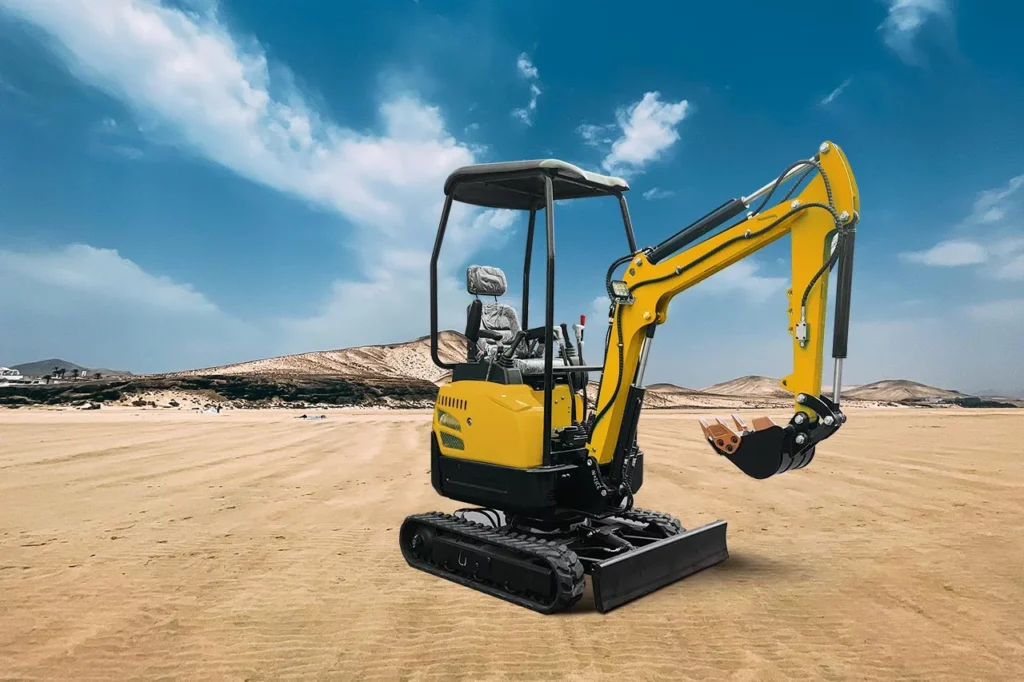Bienvenue sur mon blog !
Avant de plonger dans le contenu, j'aimerais que vous me rejoigniez sur mes plateformes de médias sociaux où je partage plus d'informations, je m'engage avec la communauté et je publie des mises à jour. Voici comment vous pouvez vous connecter avec moi :
Facebook:https://www.facebook.com/profile.php?id=100087112105480
LinkedIn:https://www.linkedin.com/showcase/99327366/admin/dashboard/
Maintenant, commençons notre voyage ensemble. J'espère que vous trouverez le contenu de ce site perspicace, intéressant et utile.
Table des matières
Introduction

Lorsque vous envisagez d'acheter la meilleure petite excavatrice, il est important de comprendre les pièges potentiels auxquels de nombreux acheteurs sont confrontés. Que vous soyez un nouveau venu sur le marché des machines ou un acheteur expérimenté, faire le mauvais choix peut entraîner des coûts inutiles et un manque d'efficacité. Ce guide met en évidence les six pires erreurs à éviter lors de l'achat de la meilleure petite pelleteuse. En comprenant ces erreurs courantes, vous serez en mesure de prendre une décision plus éclairée et de vous assurer que l'équipement que vous choisissez répond à vos besoins spécifiques.
Ne pas évaluer la bonne taille de votre chantier
Lorsque l'on choisit la meilleure petite pelleteuse, la première erreur consiste souvent à ne pas évaluer correctement la taille de la machine par rapport à votre chantier. Il est facile de se laisser séduire par des modèles dotés d'un plus grand nombre de fonctions ou de dimensions plus importantes, mais ceux-ci peuvent ne pas convenir à vos projets spécifiques. Évaluez l'espace dont vous disposez, ainsi que le type de travail que vous devez accomplir. Les petites excavatrices sont conçues pour les espaces restreints, mais surestimer leurs capacités ou en acheter une trop grande peut entraîner des difficultés de manœuvre et des inefficacités inutiles.
Ignorer le poids en ordre de marche et la stabilité
Le poids en ordre de marche de la meilleure petite pelle joue un rôle essentiel dans sa stabilité et sa capacité de levage. Les acheteurs négligent souvent de vérifier si le poids de l'équipement correspond aux conditions du sol et au terrain sur lequel ils vont travailler. Les pelles trop légères risquent de ne pas avoir la puissance nécessaire pour travailler dans des conditions difficiles, tandis que les pelles trop lourdes risquent d'endommager des surfaces délicates ou d'être instables sur un terrain accidenté. Veillez à ce que le poids corresponde aux exigences de votre travail afin d'éviter les problèmes de sécurité et d'entretien inutiles.
Méconnaissance du système hydraulique et de la compatibilité des accessoires

Les systèmes hydrauliques sont au cœur des meilleures petites excavatrices, alimentant leur flèche, leur bras et leurs accessoires. Une erreur fréquente consiste à ne pas comprendre le fonctionnement du système hydraulique ou à ne pas savoir si les accessoires que vous envisagez sont compatibles. La puissance et les performances de votre pelle sont directement influencées par la qualité et la compatibilité du système hydraulique. Avant d'acheter, assurez-vous de bien connaître les accessoires et les outils disponibles pour votre machine et de savoir si votre modèle peut les accueillir.
Ne pas tenir compte de l'efficacité énergétique et des coûts d'exploitation
Le rendement énergétique est un facteur crucial dans le choix de la meilleure petite excavatrice. Les coûts d'exploitation liés à votre excavatrice peuvent rapidement s'accumuler, surtout si elle consomme plus de carburant que nécessaire. De nombreux acheteurs se concentrent uniquement sur le prix d'achat initial, mais à long terme, un modèle plus économe en carburant peut vous faire économiser beaucoup d'argent. Renseignez-vous sur le rendement énergétique des modèles que vous envisagez d'acquérir et calculez les coûts potentiels à long terme pour vous faire une idée plus précise de ce que vous aurez à payer au-delà de l'investissement initial.
Ne pas tenir compte de l'assistance après-vente et de la garantie
Une autre erreur consiste à ne pas s'intéresser au service après-vente, aux options de service et à la couverture de la garantie. Même les meilleures petites excavatrices nécessiteront un entretien au fil du temps, et le fait de trouver un modèle sans un réseau de service ou une garantie solide peut entraîner des problèmes à long terme. La disponibilité des pièces et une équipe d'assistance bien informée peuvent faire toute la différence pour que votre excavatrice continue à bien fonctionner. Renseignez-vous sur la période de garantie, sur ce qu'elle couvre et sur la disponibilité des pièces et des services pour vous assurer que vous ne serez pas laissé en plan après votre achat.
Ne pas faire de recherches appropriées sur le concessionnaire

Enfin, s'adresser au mauvais concessionnaire est une erreur majeure lors de l'achat de la meilleure petite excavatrice. Tous les concessionnaires n'offrent pas le même niveau de service, et certains peuvent même proposer des équipements de qualité inférieure. Il est essentiel de faire des recherches sur la réputation du concessionnaire, les commentaires des clients et le service après-vente. Le choix d'un concessionnaire de confiance vous permettra non seulement d'obtenir un produit de qualité, mais aussi d'avoir l'esprit tranquille en sachant que vous faites un bon investissement.
Tableau : Principaux éléments à prendre en compte pour choisir la meilleure petite pelleteuse
| Fonctionnalité | Considérations | Importance |
|---|---|---|
| Taille et poids | S'assurer que l'excavateur est adapté au chantier et qu'il offre une stabilité adéquate. | Haut |
| Système hydraulique | Vérifier la compatibilité avec les accessoires et outils nécessaires | Haut |
| Efficacité énergétique | Tenir compte des économies à long terme et de l'impact sur l'environnement | Moyen |
| Garantie et service | Évaluer le réseau de services et la couverture de la garantie du concessionnaire | Haut |
| Soutien après-vente | Évaluer les options d'assistance pour la maintenance et les pièces détachées | Moyen |
Conclusion

Pour choisir la meilleure petite excavatrice, il faut tenir compte de plusieurs facteurs au-delà du prix d'achat initial. En évitant ces six erreurs courantes, vous serez mieux à même de faire un choix éclairé. Prenez toujours le temps d'évaluer la taille, le poids et les performances de l'engin, ainsi que l'assistance après-vente et les coûts. Une petite pelle bien choisie améliorera considérablement l'efficacité de vos projets et vous assurera une fiabilité à long terme, alors évitez ces erreurs et faites un choix judicieux.
FAQ
Q : Quel est le meilleur petit excavateur pour les chantiers étroits ?
R : La meilleure petite pelle pour les chantiers étroits dépend des contraintes d'espace et des exigences du projet. Recherchez des modèles aux dimensions compactes et dotés d'une excellente maniabilité pour naviguer dans les zones confinées.
Q : Comment déterminer le poids adéquat pour mon petit excavateur ?
R : Tenez compte à la fois du poids de la pelle et des conditions de votre chantier. Si vous travaillez sur un sol mou ou irrégulier, un modèle plus lourd peut offrir une meilleure stabilité, tandis qu'un modèle plus léger est idéal pour les surfaces plus lisses.
Q : Quels sont les accessoires courants disponibles pour les petites excavatrices ?
R : Les accessoires courants des petites excavatrices sont les godets, les tarières, les marteaux et les grappins. Assurez-vous que le modèle que vous avez choisi est compatible avec les accessoires dont vous aurez besoin pour vos travaux.
Q : Pourquoi le service après-vente est-il important lors de l'achat d'une petite excavatrice ?
R : L'assistance après-vente vous permet d'avoir accès à des services de maintenance, à des pièces et à des conseils en cas de problème avec votre machine, ce qui évite des temps d'arrêt coûteux et préserve la longévité de votre équipement.
